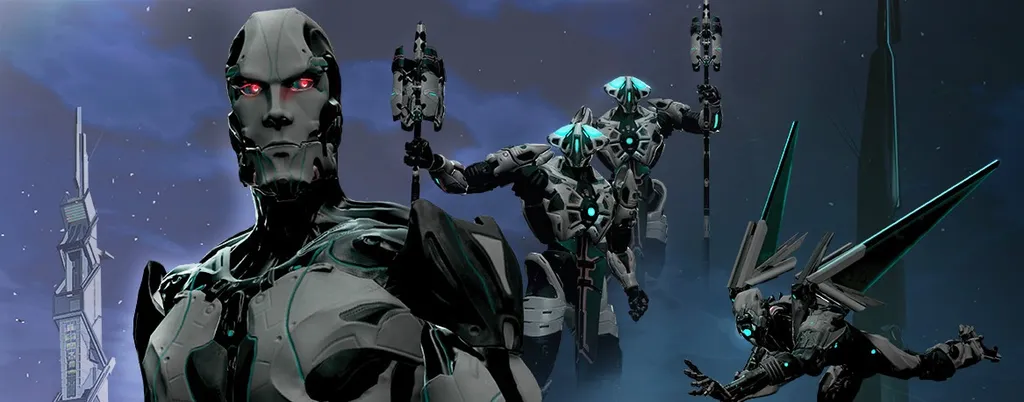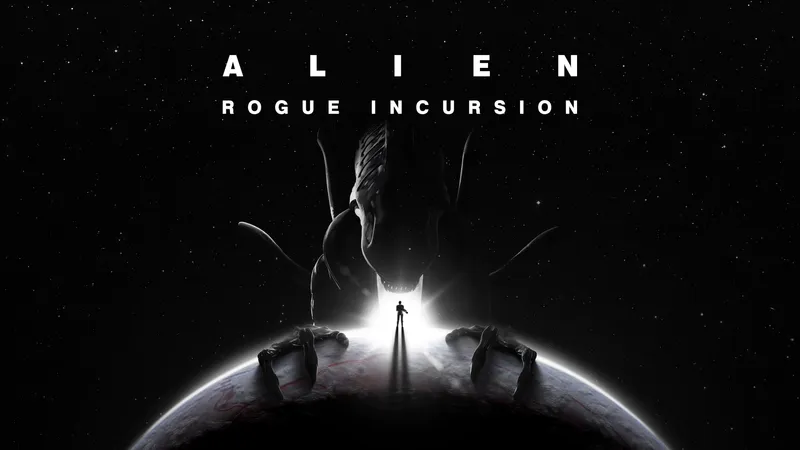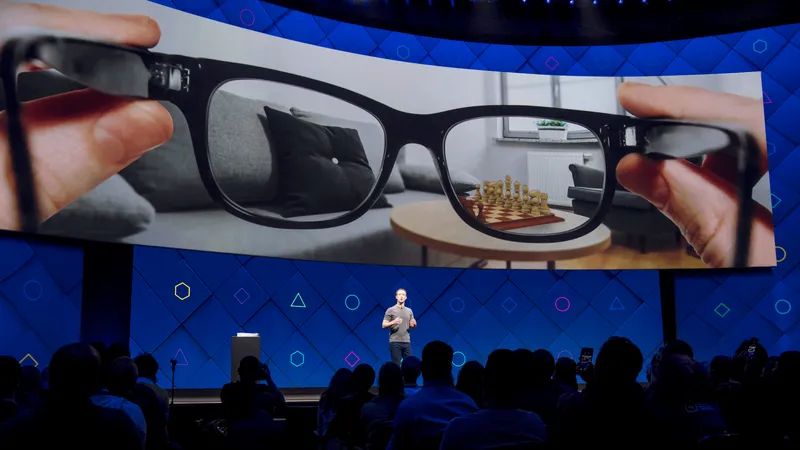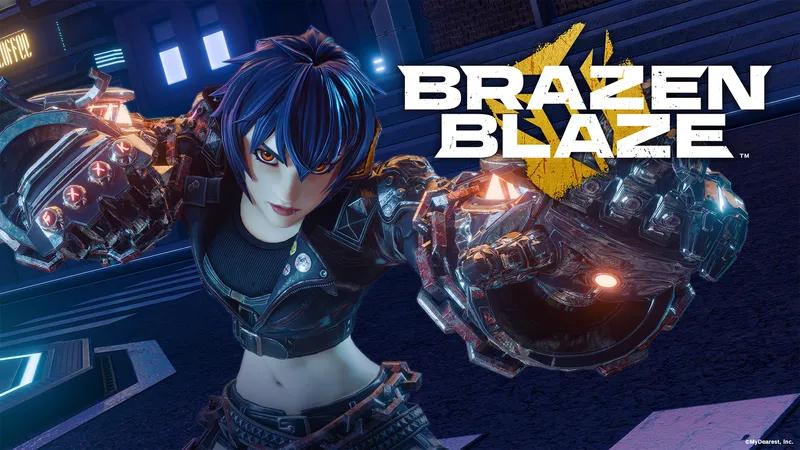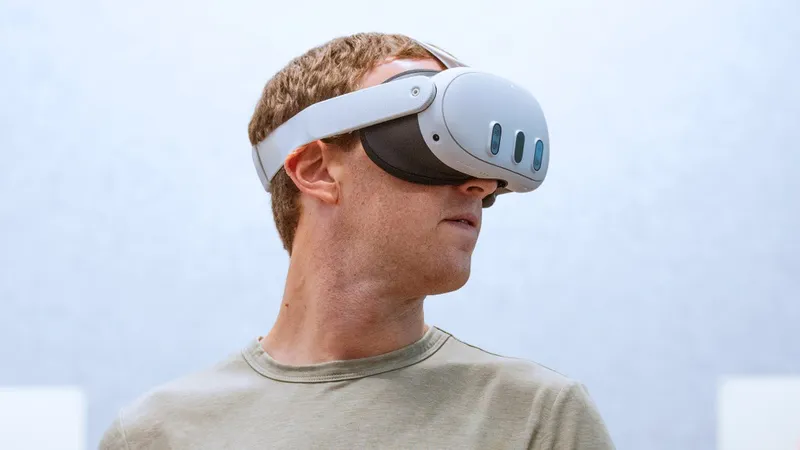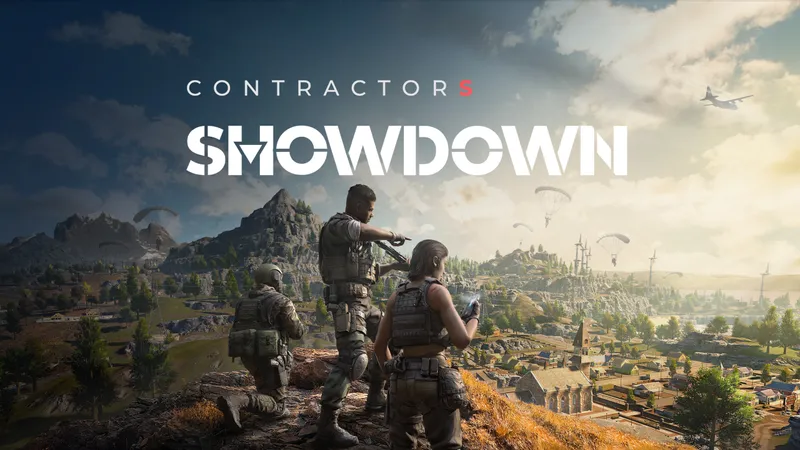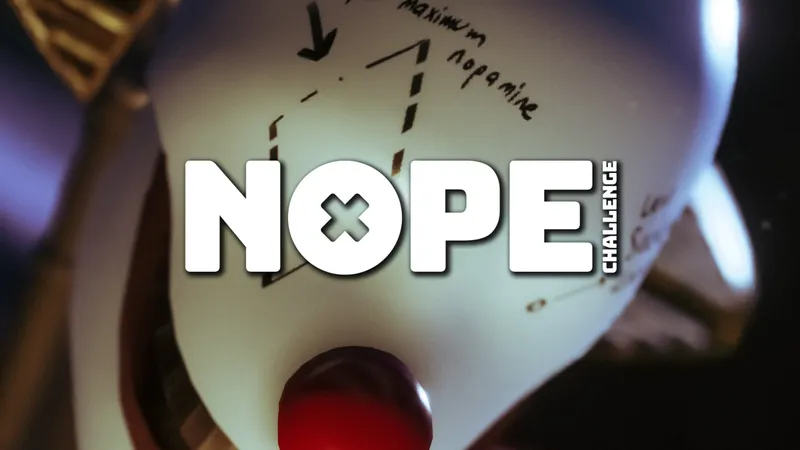UploadVR worked with Jim Ivon, President of Labrodex Studios — the team behind the upcoming VR shooter Scraper — to post some excerpts from the game’s tie-in novel: Scraper: The Rise of Cifer.
Written by prolific sci-fi writer and New York Times bestselling author Ryder Windham, the novel begins in the year 2075, and serves as an introduction to the game’s characters and backstory.
Scraper: The Rise of Cifer is now available on Amazon in both paperback and digital formats.
You can experience Scraper for yourself and meet Jim Ivon, Ryder Windham, and other developers from Labrodex Studios at PAX East at the Boston Convention and Exhibition Center taking place April 5 – 8.
Be sure to read Scraper: Rise of Cifer Chapter One if you haven’t yet.
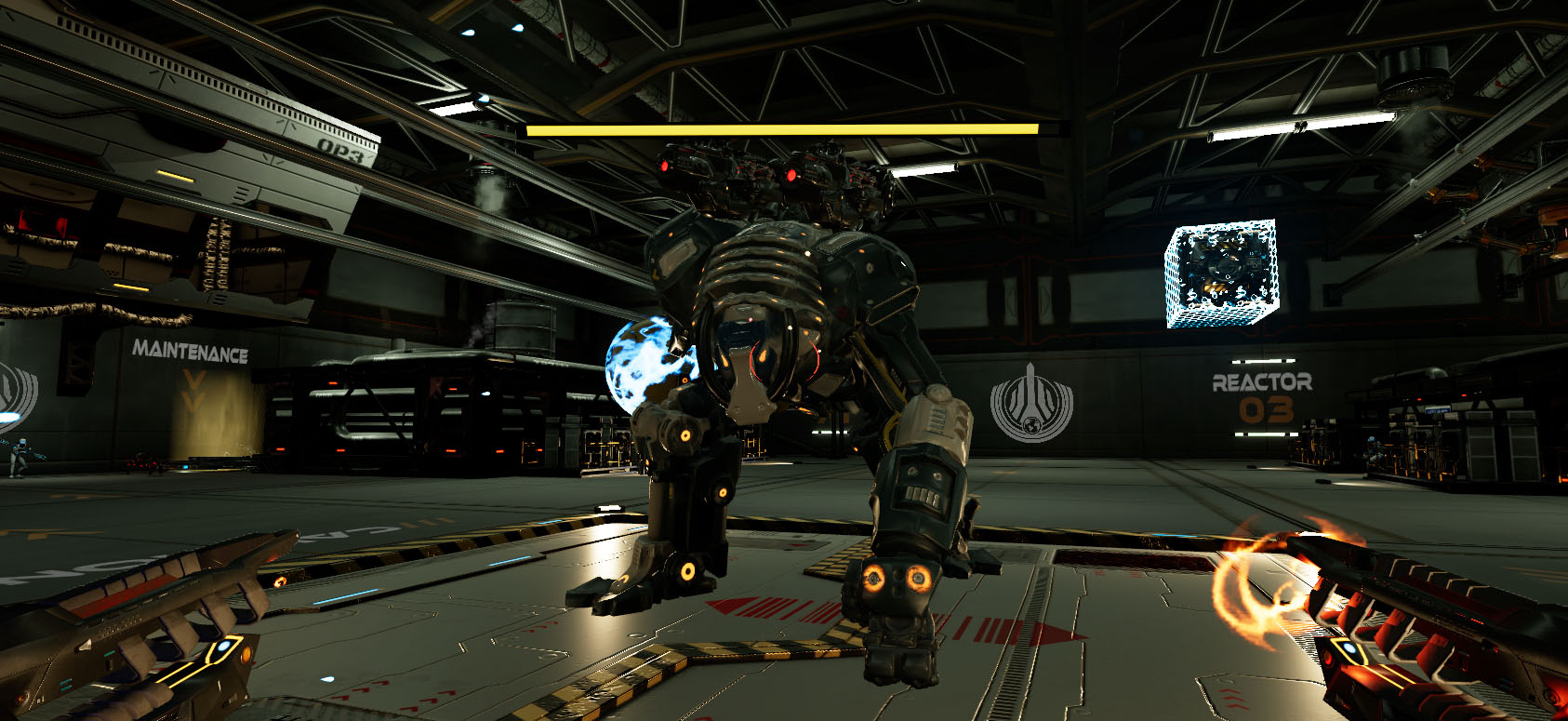
Chapter Two
According to AV-8, LCF-R had maintained that the thieves were a small group that operated quietly, and left no trails. But after witnessing the thieves blow the lock on the container, Winston had to question the integrity of LCF-R’s intel, and also whether LCF-R had underestimated the number of thieves in the gang. He considered pulling out or calling for backup.
But then he thought of LCF-R’s significant accomplishments. LCF-R had devised a plan to slow tectonic shift. He’d helped find the cure for the Rain-forest Virus. He’d created the Humech V3 Series, and also the Humech city managers.
Maybe LCF-R knows more than I do, Winston thought. He decided the night was young, and when he spoke into his microphone to address his team, he said, “Hold fire.”
The thief who’d planted the explosive device returned to the door and pressed a button. Winston’s vantage point didn’t offer a clear view of the door but he did hear it slide open. A moment later, he saw all five thieves jump back from the container as they adjusted the cylindrical objects that they held. The objects clacked and clicked as they unfolded and transformed into automatic crossbows. The thieves surprised Winston again when they triggered their weapons and released a hail of metal-tipped bolts into the open container.
Winston didn’t need his helmet’s audio enhancers to hear the staccato bursts from the crossbows or the pinging of bolts against the container’s inner walls. The only thing that stopped him from signaling Keevers and Harvey to subdue the thieves was the lack of return fire or cries for help from within the container. The thieves weren’t even trying to take cover as they shot in the same direction, aiming at the same soundless target. Whatever they were shooting at, Winston guessed the target wasn’t human.
Winston’s helmet sensors indicated Harvey was shifting his position on the gantry. Winston said, “What’s happening, Harvey?”
“The gang’s discharging their crossbows into the container, sir,” Harvey responded.
“I can see that, Harvey,” Winston said. “What are they shooting at?”
“Can’t see that, sir. I tried to get a better view, but I’m too high up.”
Winston said, “Keevers?”
“I can’t see inside either, sir. Orders?”
“Hold your positions,” Winston said.
Harvey watched the five thieves empty more bolts into the container. He kept his rifle aimed down at the thieves, and his right index finger close to his rifle’s trigger. As the thieves reached to their belts and vests for fresh ammo cartridges, Harvey saw a dark humanoid figure materialize in the container’s open door. Harvey adjusted his helmet’s night-vision visor for a sharper view just as the figure stepped down out of the container, prompting all the thieves to jump back farther as they slid the new cartridges into their crossbows.
Harvey gasped. Winston heard him over the radio and said, “Status, Harvey.”
“Someone came out of the container, sir,” Harvey said. “He looks like . . . Sir, it’s LCF-R.”
“What?” Keeping low and to the shadows, Winston stepped out from his hiding spot above the maglev tunnel and moved to a different position along the overpass, close to where he’d stashed his hoverbike. He magnified the binoculars on his visor, and the image that came into focus confirmed Harvey’s observation. Winston saw the distinctive cranium and lean, sculpt-ed-metal body of LCF-R, standing unarmed as the thieves released more metal bolts at him.
But AV-8 said LCF-R was in the Pacific Northwest.
Winston no longer questioned whether something were wrong with the robot’s data about the thieves. He wondered what had gone wrong with the robot’s brain.
But the robot’s brain wasn’t Winston’s responsibility. Nor was the robot’s own body, which LCF-R hadn’t even tried to defend against the thieves’ initial onslaught.
Winston became even more baffled. He assumed nearly everyone with access to news feeds would be familiar with LCF-R, and know that he was strictly non-military, not aggressive. Winston thought, The thieves must know who they’re shooting at.
Over the radio, Keevers said, “Orders, Sir?”
“Hold fire,” Winston said.
LCF-R’s arms had been dangling by his sides, but he raised them fast. The thieves responded by triggering their crossbows again, unleashing another barrage of bolts that pinged and glanced off LCF-R’s metal body. As dozens of bolts shattered against his torso and upper legs, LCF-R not only stood his ground with ease but looked away from the five bowmen to direct his gaze at the long hydrofoil moored at the nearby wharf.
Watching LCF-R’s movement, Winston became convinced that the robot had malfunctioned. He felt no sympathy as more bolts bounced off LCF-R’s body. Despite LCF-R’s remarkable reputation for helping humans, he was also a machine. Winston wasn’t about to allow his all-too-human allies to engage with the trigger-happy thieves unless it was necessary.
But then Winston noticed that LCF-R had turned his head again, and now appeared to be looking directly at Winston from across the distance. As a final volley of bolts smashed into LCF-R, the robot extended his left arm to point to the wharf, and then Winston heard the robot’s voice via his helmet’s radio. “Commander Winston, I believe the gang’s leader is on the hydrofoil.”
Son of a gun, Winston thought as a new realization hit him. Nothing was wrong with LCF-R’s brain. Some circumstance must have forced LCF-R to change plans, and to keep some information to himself.
Winston knew what to do next. He said, “Harvey, take the five.”
Harvey’s power rifle was still angled down, aimed at the thieves who’d shot at LCF-R. As Harvey squeezed the trigger, LCF-R flipped backward, leaping out of range of the wide burst of energy that spat from Harvey’s rifle and struck the thieves. The stunned thieves’ arms jerked away from their bodies as they dropped their crossbows before they collapsed to the ground.
Still standing on the overpass, Winston looked to the docks and saw a lone figure on the hydrofoil. Before Winston could issue orders, a stack of shipping containers exploded near Harvey, spraying fire and jagged metal in all directions. Blinding light filled Winston’s night-vision-enhanced visor. He squeezed his eyes shut in response to the brilliant burst as he fell back against a girder, and he heard Harvey cry out. The blast launched two containers straight into the mid-section of one of the gantry cranes beneath Harvey. The gantry buckled, the crane swung wild, and Harvey was thrown off his feet.
Harvey fell toward a tangle of metal cables. He held tight to his rifle with one hand as he instinctively reached out with the other to grab at anything that might stop his fall. His left thigh struck two parallel cables and he bounced off them before he landed hard atop a container.
The explosion also overloaded LCF-R’s photoreceptors, and for a split second filled his vision with intense light. Recalibrating his optics, he glanced back at the dock and saw the hydrofoil begin to pull away. He was about to go after the boat when he heard someone groaning on the top of a stack of containers behind him. He ignited his built-in thrusters and ascended, flying up and over the containers until he was hovering above Harvey. LCF-R said, “Are you all right?”
“Nothing busted,” Harvey said as he pushed himself up, “but my hel-met’s sensors may be fried. Everything’s blurry.”
Over the radio, Winston, still temporarily blinded, said, “Keevers, what’s your status?”
Keevers didn’t respond.
Winston said, “Keevers! Respond. What’s your status?”
No response.
Harvey said, “Keevers?” He heard his own voice waver. He listened, waited.
No response.
Winston said, “LCF-R, can you locate Keevers with your sensors?”
LCF-R said, “Negative, Commander. Her transponder and heat signa-ture are gone.”
“Gone?” Harvey said. “Gone where? Where is she?”
“She is gone, Lt. Harvey,” LCF-R said.
Winston contained his rage. He wanted to remind LCF-R that the plan was for no one to get hurt, but he knew blaming the robot would accomplish nothing. And Keevers knew the risks of such missions, and rage wouldn’t bring her back. Winston took a deep breath and said, “LCF-R, can you see the hydrofoil?”
LCF-R shifted his body in the air above the containers and said, “Yes, Commander.”
“Then go after it. If the leader’s on it, don’t lose him.”
“Yes, Commander,” LCF-R said again.
Harvey heard a loud whoosh from overhead as LCF-R flew off. He wanted to pull off his helmet and rub his eyes but he knew that wouldn’t help, that he’d just have to wait for his vision to come back.
Winston wasn’t so patient. Dragging his gloved fingers along the edge of a girder, he shuffled across the overpass to where he’d left his hoverbike. As he moved, he said into his helmet, “Winston to base. Dockyard 37 mission critical. Five thieves down, two MGs blinded, Lt. Keevers MIA. Bring big guns, search and rescue.” He found the bike’s handlebars, slid onto the sad-dle, slung his rifle and kept his eyes closed as he said, “Find Harvey. No lights.”
The hoverbike’s autopilot took over. As instructed, the bike’s headlight and running lights remained off as it launched away from the overpass, with its engine emitting a low hum. Winston hoped that the combination of the almost noiseless engine and deactivated lights would help him reach Harvey’s position without attracting attention from any enemies who might re-main in hiding.
The bike circled above and around a cluster of stacked containers before it came to a hovering stop near Harvey, who rested on his knees with his rifle clutched in front of him. Harvey recognized the hum from Winston’s bike. He slung his rifle over his shoulder before he extended his arm toward the noise.
Winston opened his eyes. Small bursts of light swam across his vision, but he managed to see Harvey. He reached out, grabbed Harvey’s wrist, and tugged him up to his feet.
“I’m still blind, sir,” Harvey said as he climbed onto the back of the bike. “You can see?”
“Barely,” Winston said.
“We’ve got to find Keevers,” Harvey said. “Maybe she’s alive. We can’t let her—”
Both men were looking away from the waters of the Gulf of Mexico when something exploded offshore. Winston saw the explosion flare and blossom out of the corner of his eye, and fought the urge to look directly at it. He stole a quick sidelong glance toward the Gulf, and saw flames rising from an object on the water.
Harvey said, “What was that?”
“The hydrofoil, I think,” Winston said. “LCF-R, what’s your status?”
LCF-R didn’t respond.
“LCF-R,” Winston said again, and waited. As seconds ticked by, Winston felt a mix of anxiety and anger. He expected the Multinational Guard brass would give him worse than hell if the invaluable LCF-R didn’t survive the mission.
Harvey said, “Maybe LCF-R’s transceiver got damaged?”
“Or he’s down,” Winston said. He cursed the robot and his allegedly foolproof plan. He was about to direct his bike to fly after LCF-R and the hydrofoil when he spotted something move below, near the five fallen thieves. He blinked, urging his vision to recover faster. He saw what appeared to be a pair of figures in dark clothes, walking fast, moving close together, in tandem, away from the container that the thieves had broken into.
Winston thought his eyes might be tricking him, that he was seeing dou-ble, and the pair of figures walking across the ground below might be a single person. He blinked. He wished for the figures to merge into one, and for that person to be Susan Keevers, alive and unharmed.
But his eyes had been right the first time. Two people, both wearing black sensor helmets and coveralls. They moved behind a shed. Winston realized he’d been holding his breath. He let out a long exhale.
Harvey said, “What is it, sir?”
“Two more thieves,” Winston said as he unslung his rifle and adjusted the bike’s controls to manual. “Hold tight.”
“But what about finding Keevers?”
“She’s gone, Harvey,” Winston said, and hated himself for it. He knew how much Harvey wanted to see Keevers alive too.
Keeping his eyes on the shed, and the bike’s lights off, Winston tapped the accelerator and steered the bike into a steep descent between the rows of stacked containers. Behind him, Harvey leaned back as he clung to the bike’s passenger restraint handle. The bike was still plunging toward the ground when Winston heard a hoverpod engine start with a loud whine, and then saw the source of the noise. It was a streamlined pod, speeding away from the shed. The pod had red running lights but its headlights were off.
Harvey’s stomach lurched as Winston leveled off and swung around the shed to pursue the hoverpod. Winston saw the pod angle over the maglev tracks before it vanished into a freight tunnel that led to the city. Winston tapped the accelerator again, veered into the tunnel, and sped after the pod.
Thin strips of blue lights illuminated the lengths of the tubular tunnel’s lower walls and arched ceiling. Harvey became aware of the lights as a stream of blurry ripples, and as his vision returned, the ripples seemed to solidify into single strips.
Winston banked through a curve in the tunnel. Harvey said, “My vision’s almost back to normal, sir.”
“Good,” Winston said.
Harvey heard the pod’s engine, then looked ahead and saw a pair of diamond-shaped red eyes that appeared to grow larger and brighter. He realized he was looking at the pod’s aft, and that the eyes were actually the vehicle’s taillights. He almost wished his vision hadn’t come back.
Winston saw the taillights appear to grow larger too, and knew he was go-ing too fast. He decelerated and dropped back to put a safer distance be-tween his bike and the pod, then matched the pod’s speed to keep up. He thought he saw a shadow ripple across the upper wall to his right. He looked up and saw that the shadow resembled a flying person, with two arms ex-tended forward.
LCF-R?
The tunnel’s blue lights flickered and the shadow vanished.
Winston feared his eyes were still playing tricks on him, but he kept after the pod. He knew that the freight tunnel was part of a broad transportation network, and he wondered where the fleeing thieves were headed. He remembered that LCF-R had said he believed the gang had a hideout in Beaumont, which left Winston with more questions.
Why’d they take the tunnel? Why didn’t they try escaping across the Gulf? Or are they hoping to double back to the dockyard? Although his helmet could display readouts for maps of the tunnel network, he knew better than to consult such readouts during a high-speed chase through a dark tunnel. Keeping his eyes on the pod, he said, “Harvey, call up a map. I want to know where they’re—”
The pod’s brake lights blazed in front of Winston, and the pod’s engine went from a whine to a wail as the vehicle came to a sudden stop. Winston resisted the impulse to brake because he knew such action would launch Harvey off the back seat and straight into the pod in front of them. He made a split-second decision to swerve around the pod.
Without slowing, he sent the bike into the narrow gap between the tunnel wall and the pod’s left side, then hurtled in front of the pod. He and Harvey heard the pod’s engine rev behind them, and then the pod’s headlight kicked on. The pod leaped forward, speeding after the bike.
A long straightaway yawned out in front of Winston. He knew he and Harvey were vulnerable in front of the pod. If the thieves rammed the bike, then he and Harvey were done for. He considered his limited options to down the pod or avoid a collision. He kept the bike’s headlight off as he accelerated into the straightaway, searching the lower walls for chevrons that would indicate any upcoming junctions.
Harvey said, “Sir, the way they braked, they must’ve known we—”
“Quiet,” Winston said. Keeping one hand on the bike’s controls, he pulled off his helmet and released it behind him. The helmet sailed back and bounced off the pod’s windshield, and the pod jounced in the air as it continued after the bike.
Harvey wondered why Winston had tossed his helmet. The action seemed so reckless, and now Winston’s head was exposed and unprotected. Then Harvey looked ahead, past Winston’s shoulder, and saw a light in the distance. The light grew larger and brighter, and Harvey realized they were heading straight for an oncoming maglev train.
Winston saw it too. He swerved to the right and ascended close to the tunnel’s ceiling, elevating the bike’s right side so much that he and Harvey were flying almost sideways.
Harvey felt his stomach lurch again. He saw the oncoming train’s light grow closer, and glanced back to see the thieves’ pod had vanished. He and Winston lifted higher, and the train whizzed past them, so close that Harvey tucked in his left elbow and unintentionally pushed his rifle’s barrel into the tunnel’s curved ceiling. Sparks sprayed back from the barrel’s tip but Harvey kept his grip on his weapon and pulled it back, away from the ceiling. The train made a vibrating, whooshing noise as it traveled past the bike, and then the train’s last car whizzed past the bike and vanished into the tunnel.
Harvey looked back and saw the thieves had followed Winston’s maneuver. Their pod was still following the hoverbike, traveling along the tunnel’s left side, elevated close to the ceiling. Winston turned his bare head and shouted, “Shoot the pod.”
Harvey didn’t question the command. He unslung his rifle, shifted it to rest on his right shoulder, with its barrel aimed directly behind him, and squeezed the trigger three times without looking back. The first blast of en-ergy missed the pod but the second and third thudded against the cowling below the windshield. The blasts rocked the pod but didn’t stop it. Instead of pulling back, the pod increased speed.
Winston tapped the bike’s accelerator. The pod was gaining on the bike when he saw a stream of green and yellow chevrons that angled off to his right. He knew the green chevrons indicated an exit route. The moment he saw the point ahead where the tracks diverged, he swung the bike to the right and into another tunnel. Harvey glanced back and saw the pod was still trail-ing them.
Seconds later, the bike sailed out of the tunnel and into a transport depot next to a dried riverbed at the outskirts of New Austin. In the night sky above the depot, the towers of the Scraper city extended so high that their spires looked as if they could pierce the stars. But Winston didn’t waste time admiring the view. He tapped the bike’s brakes and cut the engine as he swung hard, turning the bike so it faced the tunnel’s exit. The bike was still slowing to a mid-air stop as Winston unslung his rifle.
Harvey spun his own rifle around just as the pod shot out of the tunnel. Winston and Harvey opened fire, sending a cascade of energy directly into the pod. The hammered pod continued straight for the bike, so Winston nudged the ascender to send the bike up higher. The pod passed under-neath the bike and descended out of control. It crashed into the riverbed, kicking up mud and dirt before it rolled onto its left side and skidded to a stop, with its right side facing skywards.
“Call for backup,” Winston said.
Harvey kept his rifle aimed at the pod while he made the call via his radio, and Winston steered the bike in a wide circle around the pod. The pod’s interior airbags had deployed, obscuring the windows with bright yellow plastic. Winston descended toward a nearby embankment and brought the bike to a hovering stop. Keeping their eyes on the pod, Winston and Harvey climbed off the bike, taking their rifles with them.
“Set rifle for heater,” Winston said, “and cover me.” He crouched and started walking for the pod.
Harvey switched his rifle’s power setting. He’d only used the heat ray in training and combat simulators, but he knew that the direction of high-frequency microwave radiation would cause water in the upper epidermis to boil, causing intense pain for human targets. He hoped he wouldn’t have to use it.
Winston held his rifle before him as he moved around the pod. The on-ly thing he could see through the front and rear windows were the airbags, which were starting to deflate. Harvey followed Winston, keeping several steps behind as he kept his rifle trained on the pod.
Winston approached the rear hatch, came to a stop and said, “You’re surrounded by the Multinational Guard. Exit the pod with your hands held high in five seconds or we’ll fry you. Five . . . Four . . . Three . . . ”
“We’re coming out,” a man shouted from within the pod. The right-side door hissed open and two pairs of hands extended up through it.
“Pull yourselves up and out,” Winston said, “but keep your hands where I can see them.”
The same two black-helmeted thieves that Winston had last seen at the dockyard climbed up through the door and held their hands high as they slid down to the ground. Winston said, “Now, using both hands, helmets off. Slowly. And hold your helmets above your heads.”
The thieves did as they were told and revealed their faces. One thief was a man, the other a woman. Both had red hair. Winston and Harvey had never seen the man before, but they recognized the woman.
“Keevers?!” Harvey said.
Lt. Susan Keevers stared at Winston and said, “Surprised?”
“Not entirely,” Winston said.

